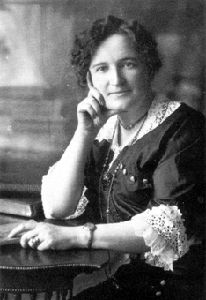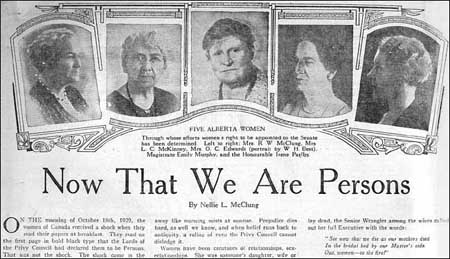People often ask us the history of our name “Nellie’s Women’s Shelter.” In 1973, when Nellie’s was founded by a group of women activists, including June Callwood, they chose to name our organization after Nellie McClung, feminist, politician, social activist and one of the “Famous Five” who fought for women to be recognized as persons under the law, eligible to hold seats in Canadian Parliament.
On August 27th, 1927, Nellie McClung along with Emily Murphy, Irene Parlby, Louise McKinney and Henrietta Muir Edwards, filed a petition to Canada’s Supreme Court asking the question “Does the word “persons” in the British North America Act include female persons?” Less than a year later, the Supreme Court came back with the answer: “No.” Obviously dissatisfied, the women took this case to a higher level of authority, the Privy Council in England, which was then Canada’s highest court. On October 18th 1929 they finally got an answer:
“The exclusion of women from all public offices is a relic of days more barbarous than ours. And to those who would ask why the word “person” should include females, the obvious answer is, why should it not?”
Following this decision, Nellie McClung, Irene Parlby and Louise McKinney went on to be elected into the Alberta Legislature, Henrietta Muir Edwards helped establish the National Council of Women, and Emily Murphy continued her work as the British Empire’s first female judge. It is our honour that two of Nellie’s McClung’s granddaughters, Emily and Caitlin McClung volunteer at Nellie’s. You can meet the McClung sisters at LEAF’s Annual Persons Day Breakfast.
We are proud that our organization is richly grounded in the advancement of women’s rights in Canada. Just as the Famous Five identified women’s denial of legal “personhood” as a barrier to the full participation and inclusion of women in society, Nellie’s work today continues to identify barriers that make it difficult for women to leave abusive situations such as lack of affordable housing and childcare and an immigration system that keeps women vulnerable and in danger. In the spirit and memory of Nellie McClung and the Famous Five, we remain committed to the work of ending violence so that all women may live free from fear, able to contribute as full and participating members of society.





